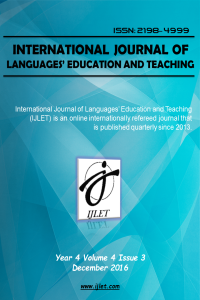EVALUATION OF EFFICIENCY AND EFFECTIVENESS OF EDUCATION MANAGEMENT SUPERVISION PLANNING AND ECONOMY AT MASTER PROGRAMS
Öz
The purpose of this study is to investigate the effectivity and efficiency of education administration, supervision, planning and economics graduate degree. To achieve this purpose, graduate students definitions were revealed on effectivity and efficiency of graduate programme. Research data were collected through questionnaires. Opinions were investigated quantitatively through questionaires developed by the researcher both on effectivity and efficiency. The total number of questionaires collected is 334 from graduate participants. The findings revealed that graduate students most often referred to methodology and literature study in their definition of education administration, supervision, planning and economics graduate degree and effectivity and efficiency. Participants stated their ideas of effectivity and efficiency on graduate programme.
Anahtar Kelimeler
Educational managenment Educational supervision Educational planning Effectiveness Efficiency
Kaynakça
- Thomson, P. (2000). Move over Rover! An essay/assay of the field of educational management. UK Journal of Educatıon Policy, 15(6), 717-732. Turan, S. (2000). John Dewey’s report of 1924 and his recommendations on the Turkish educational system revisited. History of Education, 29(6), 543-55 Willower, D. J., ve Forsyth, P. B. (1999). A brief history of scholarship in educational administration. In J. Murphy, ve K. S. Louis (Eds.), Handbook of research in educational administration (pp.1-23). San Francisco: Jossey- Bass.
EĞİTİM YÖNETİMİ DENETİMİ PLANLAMASI VE EKONOMİSİ YÜKSEK LİSANS PROGRAMININ VERİMLİLİĞİNİN VE ETKİLİLİĞİNİN DEĞERLENDİRİLMESİ
Öz
Bu araştırmanın temel amacı eğitim yönetimi denetimi planlaması ve ekonomisi yüksek lisans programının verimliliğini ve etkililiğini incelemektir. Bu amaca yönelik olarak lisansüstü program öğrencileri için neden önemli olduğu konusundaki görüşleri alınmaya çalışılmıştır. Araştırma verisi anket uygulamasıyla toplanmıştır. İlk olarak literatür taraması yapılarak ve uzman görüşü alınarak araştırmacı tarafından geliştirilen ölçek formları aracılığıyla lisansüstü program öğrencilerinin konuya ilişkin görüşleri nicel olarak incelenmiştir. Araştırma anketini 334 lisansüstü program öğrencisi katılımcı yanıtlamıştır. Araştırma bulguları lisansüstü program öğrencilerinin eğitim yönetimi denetimi planlaması ve ekonomisi ile verimlilik ve etkililik tanımlarında temel olarak yüksek lisans dersleri ve değerlendirme düzeyine ilişkin ölçütlere daha sık olarak değindiğini ortaya koymuştur. Programa ilişkin olarak katılımcılar yüksek lisans programının verimliliği ve etkililiği üzerine görüşlerini belirtmişlerdir. Bu görüşler paket program ile analize tabi tutularak yüksek lisans programının ve verimliliği ve etkililiği değerlendirilmiştir. Yapılan değerlendirme sonucunda programın amaç ve ilkeleri ile verilen eğitimin doğru bir orantıda eşleştiği görülmüştür.
Anahtar Kelimeler
Eğitim yönetimi eğitim denetimi eğitim planlaması eğitim ekonomisi verimlilik etkililik
Kaynakça
- Thomson, P. (2000). Move over Rover! An essay/assay of the field of educational management. UK Journal of Educatıon Policy, 15(6), 717-732. Turan, S. (2000). John Dewey’s report of 1924 and his recommendations on the Turkish educational system revisited. History of Education, 29(6), 543-55 Willower, D. J., ve Forsyth, P. B. (1999). A brief history of scholarship in educational administration. In J. Murphy, ve K. S. Louis (Eds.), Handbook of research in educational administration (pp.1-23). San Francisco: Jossey- Bass.
Ayrıntılar
| Birincil Dil | Türkçe |
|---|---|
| Konular | Türkçe ve Sosyal Bilimler Eğitimi (Diğer) |
| Bölüm | Araştırma Makalesi |
| Yazarlar | |
| Yayımlanma Tarihi | 30 Aralık 2016 |
| Yayımlandığı Sayı | Yıl 2016 Cilt: 4 Sayı: 3 |


